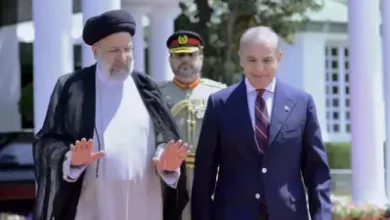Russia is under so many sanctions. To what extent do they really contribute?
So many penalties. In response to Moscow’s invasion of Ukraine, the United States, the United Kingdom, and the European Union are slapping Russia with fresh sanctions once again. This time, they are in reaction to the passing of prominent opponent of the Kremlin, Alexei Navalny, who passed away last week in an Arctic prison camp.

The United States has targeted almost 4,000 politicians, oligarchs, businesses, banks, and other entities with its most recent round of sanctions, which were announced on Friday, one day before the war’s second anniversary. The Russian President Vladimir Putin and his allies are among the more than 2,000 individuals and organizations that the EU has targeted.
The goal of the penalties, according to President Joe Biden, is to force Putin to pay “an even steeper price for his aggression abroad and repression at home.” However, Putin’s aspirations have not been completely destroyed by the sanctions.
What is the new sanctions’ primary point?
The most recent sanctions target individuals and businesses involved in Russia’s banking, import, and armaments production industries. They also go after three officials that Western politicians accuse of having a hand in Navalny’s demise, as well as others they believe are accountable for abducting and reeducating Ukrainian youngsters.
Numerous new restrictions target Russian companies that support the war effort of the Kremlin, including importers of machine tools and makers of industrial chemicals and drones. The EU is also pursuing foreign companies who, according to authorities, have sent Russia dual-use items that may be used in conflict.
Sanctions imposed on individuals prevent them from traveling and doing business in the West, as well as from owning property in the United States and other nations that target them. In addition, they penalize individuals or businesses that transact with sanctioned parties.
How do the sanctions connect to the passing of Navalny?
Three Russian officials are being pursued by the US State Department because they are allegedly linked to Navalny’s demise. Among them is the deputy head of the Federal Penitentiary Service of Russia, who was given a promotion to colonel general by Putin on Monday, three days after Navalny passed away.
The three individuals are prohibited by the sanctions from entering the country and are unable to access property that is held by the US. However, it is improbable that they visit, own property, or have relatives in the West, thus the activity is essentially symbolic. According to John Kirby, the spokesperson for national security at the White House, more US action in relation to Navalny’s death is planned.
This week, the United Kingdom also sanctioned six Russian prison administrators who oversaw the penitentiary where Navalny passed away.
On Friday, February 23, 2024, in Washington, D.C., President Joe Biden discusses the sanctions on Russia during a meeting with the National Governors Association in the White House East Room.
With the second anniversary of the Ukraine War and the death of Navalny, the US and EU impose more sanctions on Russia.
What role does the price limit on Russian oil play?
With the intention of reducing Russia’s income from fossil fuels, the Group of Seven allies set a $60 per barrel price restriction on Russian oil in December 2022.
According to the Treasury Department, the restriction resulted in a more than 40% decrease in Kremlin oil tax collection for the first nine months of 2023. However, according to the IMF, Russia’s economy is still expected to expand, with a 2.6% GDP growth in 2024.
Opinions among policy professionals about the efficacy of the price limit differ. A full oil embargo, a reduction in the price ceiling, or even stricter implementation of the existing policy have all been demanded by some.
The EU and US should strengthen their enforcement of the limit, according to a Friday article written by MIT economists Simon Johnson and Catherine Wolfram for the European Centre for Economic Policy Research.
The United States and its allies, according to Treasury Deputy Secretary Wally Adeyemo, “will be doing is taking actions that will increase the cost” of Russia’s oil output rather than lowering the price ceiling.
In general, how successful are the penalties?
The Biden administration is aware that sanctions are insufficient to halt Russia’s incursion on their own. Furthermore, a number of policy experts argue that the sanctions are insufficient, citing the expansion of the Russian economy as proof.
The most recent sanctions are “likely to be of limited potency in stifling Russia’s economy or its war effort,” according to Cornell economist Eswar Prasad. The standoff in Congress on more military assistance for Ukraine, the “escape valve” supplied by China, and Russia’s capacity to get past many of the sanctions, according to him, “have substantially eroded the symbolic and substantive power of such sanctions.”
The West still has alternatives on how to penalize Russia even more.
Although it’s a complicated legal issue, the United States and Europe are thinking of using $300 billion in assets from Russia’s central bank that have been blocked to pay Ukraine for the conflict. Russia may potentially be named a state sponsor of terrorism by the United States, a concept that has received support in Congress from both parties.
What effect is Congress’s stalling of US funding having on the war effort?
The Senate authorized funding for Ukraine and other nations, but House Speaker Mike Johnson, R-Louisiana, is preventing voting on it. As a result, sanctions are forced to carry out a large portion of America’s war effort.
In terms of personnel and ammunition, Russia now has a significant edge. According to Dara Massicot, a senior scholar at the Carnegie Endowment for International Peace, Putin’s troops have a 2:1 advantage in personnel and a 5:1 advantage in weapons.
The arithmetic presents a challenge to Ukraine’s military capabilities. To restock its stockades and help level the odds, it needs international assistance. The additional restrictions, instead of addressing the existing shortage of soldiers and weapons, will, at most, reduce the output of Russian companies moving ahead.
What impact do the sanctions have on regular Russian citizens?
them Russians were initially alarmed by Russia’s invasion of Ukraine as flights were halted by Western countries and the ruble lost value, forcing them to line up at cash machines to withdraw hard money. As a result, the Russian central bank raised the benchmark interest rate to 20% in an attempt to contain the currency’s decline, which increased borrowing costs.
However, Putin is still in charge two years after the invasion, and the sanctions haven’t convinced regular Russians to call for an end to the conflict just yet. Russians are starting to notice a change in the style of life as more and more Western items are being replaced and store prices are rising.
In Russia, popular brands like McDonald’s have vanished and have been replaced with the Russian phrase “Tasty – that’s it.” Due to the high interest rate of sixteen percent in Russia, several individuals have been forced to postpone their intentions to purchase flats.
Western products like iPhones are still available, but they are considerably more expensive. Due to the lack of direct flights, travel to Europe and the US has also become almost unaffordable. Because of the weakening ruble, spending money overseas has become significantly more costly for Russians.
However, a large number of Russians avoid visiting Europe, do not depend on Western goods, and believe that the sanctions are beneficial since they help Russia grow more independent.







